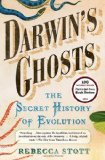Summary | Excerpt | Reviews | Beyond the Book | Readalikes | Genres & Themes | Author Bio

Critics' Opinion:
Readers' Opinion:
First Published:
Jun 2012, 416 pages
Paperback:
Mar 2013, 416 pages
 Book Reviewed by:
Book Reviewed by:
Lisa Guidarini
Buy This Book
Eighteen predecessors. A good number. But still a relatively small one.
Meanwhile the hostile reviews of Origin were becoming more overtly aggressive. The gloves were off. “The stones are beginning to fly,” Darwin wrote to Hooker, and he reassured Wallace that “all these attacks will make me only more determinately fight.” To Asa Gray he wrote: “I will buckle on my armour & fight my best. . . . But it will be a long fight. By myself I shd. be powerless. I feel my weak health acutely, as I cannot work hard.”
There were still other important evolutionists yet to step out of the shadows to claim some of Darwin’s glory.
On April 7, 1860, his favorite journal, the Gardeners’ Chronicle, carried an article by a man he had never heard of named Patrick Matthew, a Scottish landowner and fruit farmer. Matthew claimed that he had discovered natural selection back in 1831, twenty-eight years before Darwin. There was no beating about the bush. This was a direct accusation: Darwin had no right to claim natural selection as his own, Matthew wrote. By way of proof, he republished numerous short extracts from his original book, unpromisingly entitled Naval Timber and Arboriculture.
Darwin was horrified that such an attack should be rehearsed in the pages of his beloved Gardeners’ Chronicle. Moreover, Matthew’s claim to be the discoverer of natural selection was a strong one. Seriously alarmed, Darwin sent for the book and was reassured to find that the passages in question were tucked away in the appendix of what was a very obscure and specialist book. Nonetheless he determined to be a gentleman.
A week or so later Darwin sent a letter to the Gardeners’ Chronicle. “I freely acknowledge that Mr. Matthew has anticipated by many years the explanation which I have offered of the origin of species, under the name of natural selection,” he wrote. “I think that no one will feel surprised that neither I, nor apparently any other naturalist, has heard of Mr. Matthew’s views, considering how briefly they are given, and that they appeared in the Appendix to a work on Naval Timber and Arboriculture. I can do no more than offer my apologies to Mr. Matthew for my entire ignorance of his publication.”
Darwin’s response took the wind out of Matthew’s sails. Flattered and mollified, the fruit farmer published his final word on the matter in the Gardeners’ Chronicle on May 12: “To me the conception of this law of Nature came intuitively as a self-evident fact, almost without an effort of concentrated thought. Mr. Darwin here seems to have more merit in the discovery than I have had; to me it did not appear a discovery.”
Matthew had conceded the throne, but he retained his claim to an important place in Darwin’s list.
Eighteen names became nineteen.
That same May, Charles Lyell sent Darwin a paper on natural selection by a Dr. Hermann Schaaffhausen published in 1853; nineteen names became twenty.
In October 1860, an Irish doctor named Henry Freke sent Darwin a pamphlet he had published in 1851 describing animals and plants evolving from a single filament. The pamphlet was, Darwin told Hooker with some relief, “ill-written unintelligible rubbish.” But if Darwin was to play by the rules of the game, even eccentric Henry Freke had a claim to a place in the list.
Twenty names became twenty-one.
By the time Darwin revised the “Historical Sketch” again for the third English edition of Origin of Species in late 1860, his list of predecessors had grown to include thirty men, including his own grandfather. New claimants included Patrick Matthew, Henry Freke, Constantine Rafinesque, Robert Grant, Dr. Schaaffhausen, and Richard Owen.
Putting the poison-tongued Oxford naturalist Richard Owen on the list gave Darwin particular pleasure. Owen had written a spiteful and envious review of Origin in April 1860. “Odious,” Darwin had called it. Owen had not even had the courage to sign his name to it, he complained; instead he had taken cover in anonymity, although Darwin’s friends had later rooted out his identity. Owen had also sneered at Darwin’s failure to include a list of his predecessors. So putting Owen on the list was for Darwin a way of getting even, a way of ridiculing Owen’s philosophical inconsistencies and contradictions. In the new version of the “Historical Sketch,” he quoted Owen’s extraordinary claim of 1852 that he had discovered natural selection, allowing himself a touch of scorn: “This belief in Professor Owen that he then gave to the world the theory of natural selection will surprise all those who are acquainted with the several passages in his works, reviews, and lectures, published since the ‘Origin,’ in which he strenuously opposes the theory; and it will please all those who are interested on this side of the question, as it may be presumed that his opposition will now cease.”
Excerpted from Darwin's Ghosts by Rebecca Stott. Copyright © 2012 by Rebecca Stott. Excerpted by permission of Spiegel & Grau, a division of Random House, Inc. All rights reserved. No part of this excerpt may be reproduced or reprinted without permission in writing from the publisher.





The Funeral Cryer by Wenyan Lu
Debut novelist Wenyan Lu brings us this witty yet profound story about one woman's midlife reawakening in contemporary rural China.
Your guide toexceptional books
BookBrowse seeks out and recommends the best in contemporary fiction and nonfiction—books that not only engage and entertain but also deepen our understanding of ourselves and the world around us.